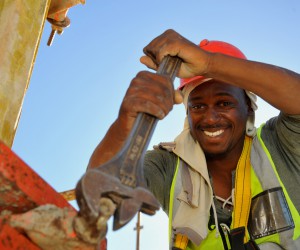The expansion of generation and transmission capacity, and the rapid adoption of renewables such as solar, promise economic benefits and improved quality of life across Africa, power sector stakeholders have heard.
At a stakeholders’ briefing held in Sandton this week ahead of the annual POWER-GEN & DistribuTECH Africa conference and business expo in July, Eskom said that great strides have been made in reducing load shedding and stepping up power infrastructure maintenance in South Africa. Industry experts also noted that renewable energy is going mainstream, offering significant potential to provide affordable power to under-served rural areas across the continent. In addition, high-level conferences such as POWER-GEN & DistribuTECH Africa were increasingly giving African power sector players an opportunity to learn from international mistakes and leapfrog into next generation power generation and distribution, they said.
Willy Majola, Senior General Manager Engineering at Eskom, speaking on behalf of Matshela Koko, Group Executive Generation at Eskom, said: “Since August last year, we have not done any load shedding. To achieve this remarkable performance, we have stepped up maintenance and we are bringing more generation capacity online. On the transmission side, Eskom is rolling out 765kV lines for more efficient bulk distribution, and has installed over 6,000km of transmission lines in the past seven years. On the distribution side, we have electrified over 4.6 million households since 1991.”
Majola said a key factor in improving power generation and distribution was collaboration: “We are well aware of the big responsibility on our shoulders and the impact electricity has on our economy.
Somebody once said ‘electricity is the oxygen of our country’. It supports more than economic development, but quality of life. Power and other infrastructure bring clean water, clean air and a better standard of living for all. We realise we cannot do it on our own. Therefore, we work with many international organisations and local universities to increase our knowledge and overcome challenges. In line with this, our partnership with POWER-GEN & DistribuTECH Africa, which has been in place since 2012, is a beneficial one. Through this association, we meet many industry players, which enriches us.”
Noting that other African countries learn from South Africa’s example, POWER-GEN & DistribuTECH Africa conference chair Dr Willie de Beer said: “South Africa is reforming the industry by default. By introducing IPPs, enabling self-built transmission grids and supporting the solar revolution, our industry is adapting to change and moving away from the hW/H utility model.”
Renewables, in particular solar, present significant hope for affordable power that can be rolled out quickly in under-served areas, stakeholders said. “Solar is reforming the industry, so utilities have to adapt to accommodate this,” de Beer noted.
Earlier, Sindiswa Mzamo, Chief Operating Officer of the Edison Power Group and POWER-GEN & DistribuTECH Africa participant noted that Africa had reached a tipping point for the adoption of solar power. “Across Africa, solar is the solution for powering rural communities, because it is cost effective and does not need to be connected to a grid to power an isolated geographic area. The wave of solar adoptions might be one of the most important initiatives in African power right now,” she said.
Glenn Ensor, Managing Director of conference organisers PennWell, told stakeholders that due to the growing importance of solar power in Africa, POWER-GEN & DistribuTECH Africa would focus strongly on solar technologies and strategies this year. He also announced that a delegation of Turkish solar product manufacturers would travel to South Africa to participate in the expo, showcasing advanced solar technologies suited to African markets.
Ensor said: “PennWell has 106 years of experience in putting information and conferences together around the world. Although we know the power industry drivers differ by region, there are similar issues being wrestled with around the world. Through POWER-GEN, we bring international expertise here, so that Africa can learn from other regions and move forward in the most efficient way,” he said.
The 2016 edition of POWER-GEN & DistribuTECH Africa will highlight a number of other key themes, including the maintenance and management of ageing assets, the nuclear power question, the gamut of renewable energies, and advanced technologies and smart grids. The conference has also expanded its reach to include energy heavy industries such as mining, plastics and manufacturing. By bringing together over 2,000 stakeholders from across the power value chain – from generation through to end users – POWER-GEN & DistribuTECH Africa 2016 aims to facilitate networking and knowledge sharing that catalyses power sector advancement across the continent.
Under the theme ‘Creating power for sustainable growth’ POWER-GEN & DistribuTECH Africa 2016 will be staged from 19 – 21 July at the Sandton Convention Centre, with a strong focus on renewable energy, sustainable power generation and distribution, pan-African power provision and smarter management and grids.
Because power challenges cannot be seen in regional isolation, PennWell says, greater pan-African participation has been encouraged by engaging more pan-African power stakeholders in the event advisory boards by inviting a delegation party of over 50 sub-Saharan African VIPs from Botswana, Ethiopia, Ghana, Lesotho, Namibia, Nigeria, Swaziland, Tanzania, Uganda, Zambia and Zimbabwe, among others to attend as guests and participate in scheduled B2B matchmaking sessions with potential business partners and suppliers.
For more information, and to view the agenda, go to www.powergenafrica.com. Follow on twitter @PGAFRICA and https://www.facebook.com/POWERGENAFRICA






